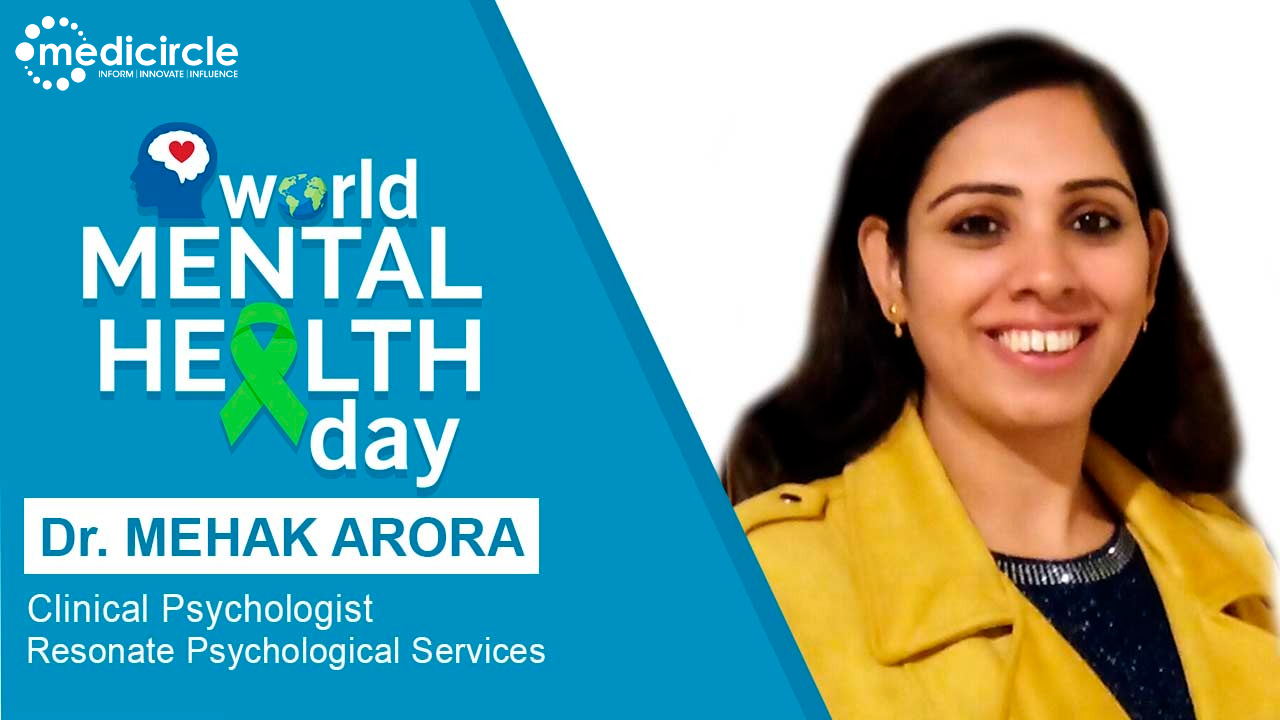Mental health matters because when we feel better, we do better. Mental health is important at every stage of our lives and impacts our thoughts, behaviours and emotions. It plays an important part in maintaining healthy relationships and allows you to adapt to changes in your life and cope with adversity. World Mental Health Day (WMHD) is celebrated annually on 10 October, is organized by the World Federation for Mental Health and endorsed by the World Health Organization (WHO). COVID-19 pandemic has a major impact on people’s mental health, therefore the need to observe this day becomes even more important. It’s important to talk about mental health, so others can also come forward about it. We at Medicircle are conducting the World Mental Health Day Awareness Series to raise awareness about mental health issues that are currently affecting the world and ensure people enjoy good mental health and wellbeing.
Dr Mehak Arora is working at Resonate Psychological Services since July 2016. She has been conducting psychotherapy on clients presented with various clinical disorders like anxiety disorder, mood disorder, somatoform disorder, adolescent issues, relationship issues etc. Also, she has conducted workshops on various mental health topics. She has been Trained in the use of psychological tests and the application of various therapy intervention techniques like CBT, REBT, ACT, DBT, MET, SFT, Family & Couples therapy etc.
Importance of Mental Health
She begins by explaining mental health, “It is a combination of psychological, emotional, cognitive and behavioural factors that contribute to our well being. It is about what we feel, think and behave. Sometimes we suffer from mental illness or mental disorders.”
“Mental health is important for two main reasons. The first is that it helps cope with daily stressors. Having good mental health can help us navigate life's stress and pressures. It helps us be ourselves if we are mentally healthy.”
Causes of Mental Illness
She says, “I have observed a trend that many note trauma and abuse as the causes of mental health. There are many other factors that can contribute to mental health problems. There are many biopsychosocial problems.”
“Biological or genetic factors can cause mental illness. If someone in your family is suffering through some disorder then it can get passed to you via your genes. For instance, depression, anxiety disorder, addictions are transferred genetically. If both parents suffer from mood disorders then it too passes. If one is suffering from diabetes, autoimmune diseases or blood pressure then they are predisposed to having mental health disorders later on.” “Psychological factors, internal and external, affect one's mental health. Many intrapsychic conflicts affect one’s mental health. For example, a girl wants to get married but she also wants to get a job. This can cause psychological turmoil for her.” “Here the third factor, social factors, also play a role. There is pressure from parents and society to get married early. The pressure to be able to do better also causes stress on the individual. For others, the stress of earning and having financial freedom can cause pressure.”
Treatments for Mental Illness
Dr Arora explains, “Just like physical illnesses, there are many mental health problems. Some disorders are curable while certain disorders (like genetic ones) take a while to get cured. 33% of people will get cured, 33% will get cured partially and the rest may not be able to get cured depending on their disease.
“With therapy, certain improvements will be there. It will make their daily suffering more bearable. Therapy can diagnose the root cause of the problem and that helps many come out of their problem. It is a long term process that cannot give immediate results.” “In diseases like bipolar disorder and schizophrenia, the treatments need the use of medications. These are diseases that are very unstable and require long term medication. In other instances, therapy alone can cure a person’s mental health problem. The best way to treat it is to use both, therapy and medications.”
(Edited by Priyal Shah)

 A combination of psychological, emotional, cognitive and behavioural factors contribute to our mental well being. Here are 3 causes of mental health and the 2 ways it can be cured.
A combination of psychological, emotional, cognitive and behavioural factors contribute to our mental well being. Here are 3 causes of mental health and the 2 ways it can be cured. 









.jpeg)



.jpeg)
.jpeg)

.jpeg)


.jpeg)



.jpeg)
.jpeg)
.jpeg)


.jpg)

